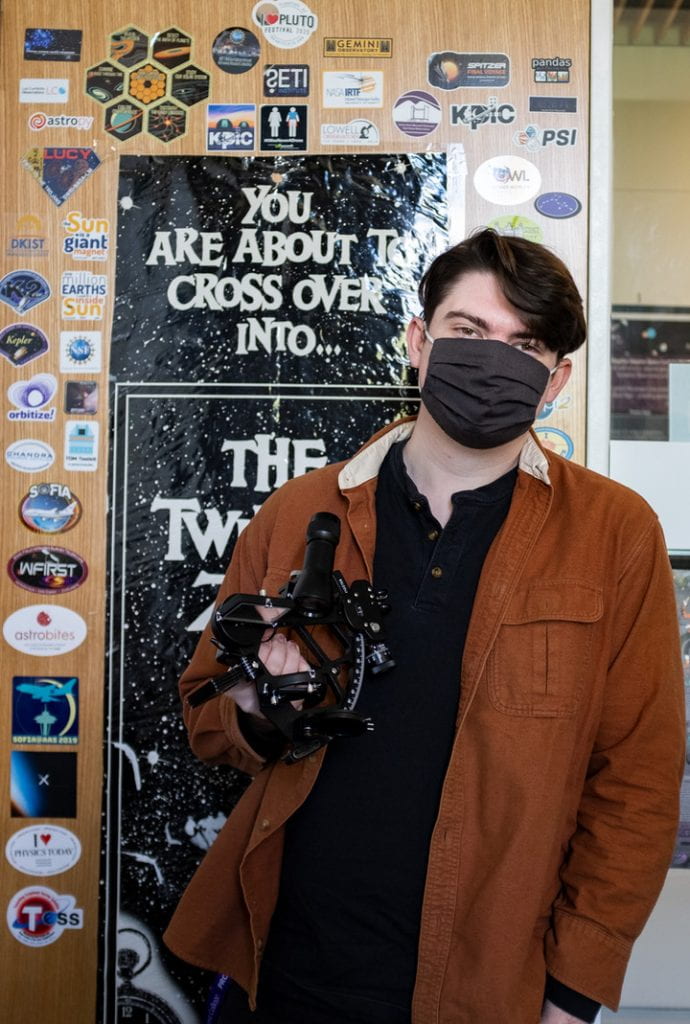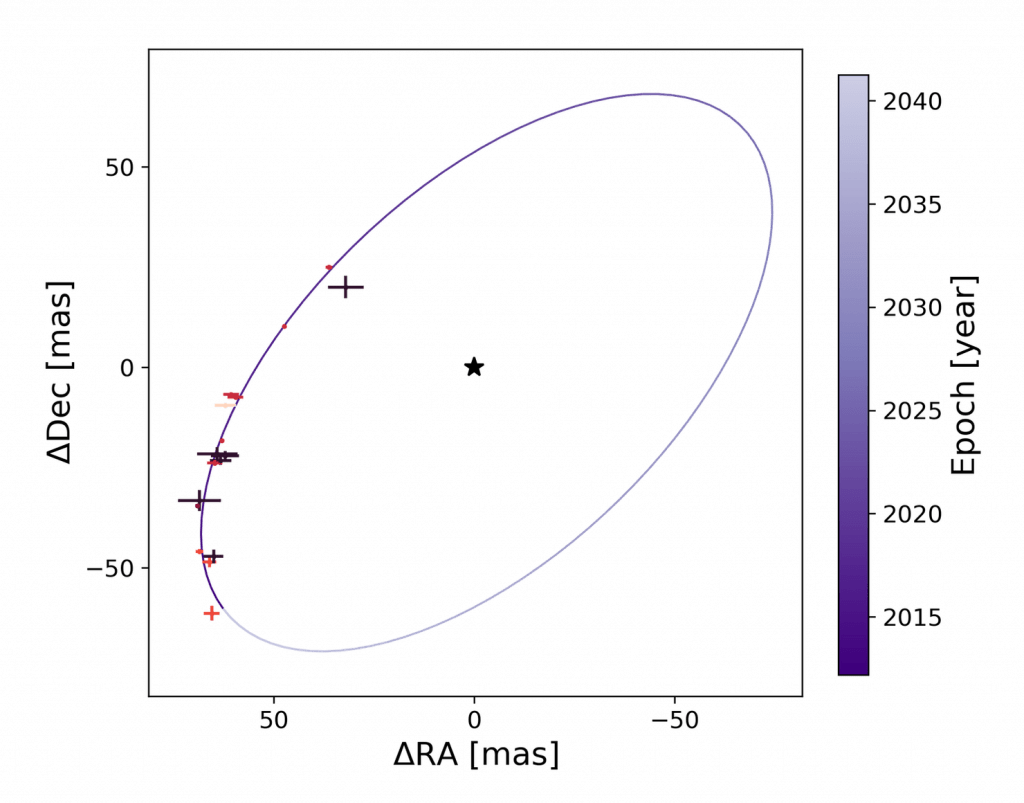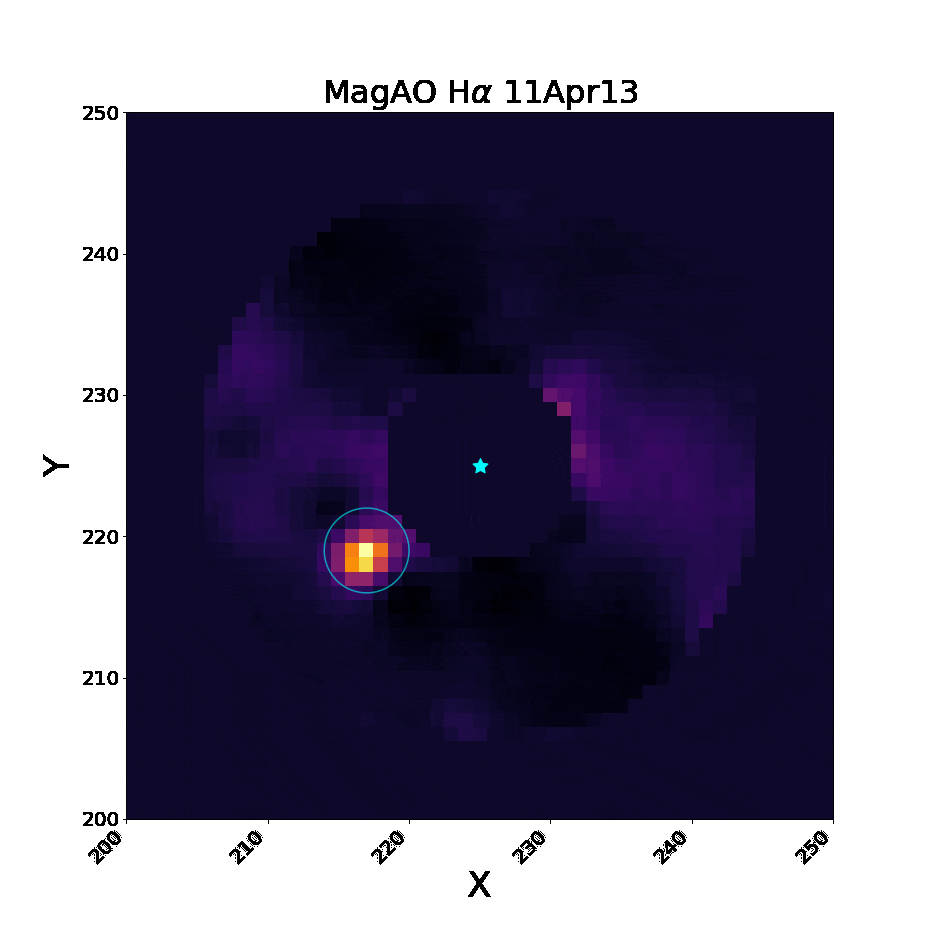
William Balmer is a senior astronomy and physics double major. They took time out of their busy end-of-term schedule to talk about their thesis with the astronomy department: measuring the orbit and brightness of a young star embedded in a disk of material around another young star. The following was adapted from an email interview between Sarah Lapean and William Balmer.
Tell us a bit about yourself; what life experiences influenced you to write a senior thesis?
I know a few things about myself: I’m alright at doing research and I’m really bad at taking classes. I had been doing research related to my thesis for a few years, and I think I had decided early on it was something I was interested in, because it was another way I could continue to research during the school year and take fewer classes.
Can you please talk about the research you’re doing for your senior thesis?
My thesis investigates the motion of a young binary star. This particular star system, HD 142527, is surrounded by a disk of gas and dust that exhibits signs of planet formation. The motion of the binary pair might disrupt forming planets, so my project sought to determine the orbit of the binary to determine how the disk is affected by the two stars. In the process, I was tasked with calibrating the instrument our lab uses to image planet forming stars.

Figure 1: One of more than 1,000,000 possible orbits fit to the observed motion of the binary star HD 142527 A & B. A is represented by the black star and the measured positions of B are represented by the crosses, which are colored depending on the instrument/telescope used to observe the binary.
What kinds of responsibilities do you have when conducting your research?
It depends on the project, your collaborators, etc, but often you have a responsibility not only to conduct your research but also to meet frequently with your lab and your advisor, to present on your work, and to craft a narrative about what you’re doing so that you can communicate more effectively to people.
What does the schedule of a thesis student look like?
I think the schedule of a thesis student depends almost entirely on that student. Largely you set your own schedule, besides deadlines set out by the school or your advisor. My favorite haunt is the astronomy lab, on the first floor of the science center, and usually I’d get brunch and take a COVID test before heading there to work for the day. My workflow is very fluid, I write a lot of to-do lists, so I can’t give you a good step-by-step of what I get up to. My schedule looks like a lot of reading and a lot of coding, I suppose.
In what ways does your research play into the “bigger picture” that you find meaningful?
I think astronomy is always about the “bigger picture,” really! What I love about this project in particular is that there are so many ways I can contextualize it, sometimes the work has felt so multifaceted that it’s been overwhelming to try and explain. I usually tell people that my research tries to understand how planets like Tatooine, the planet Luke Skywalker from Star Wars is from, could have formed. This project informs a lot more than just that, though. It touches on questions about the formation of binary systems, the growth of stars during their adolescence, the volatility of that growth process, and the creation of debris structures (like the asteroid belt in our solar system). I could go on and on.

Figure 2: A gif of four observations of the smaller component of the binary (HD 142527 B) taken from the Magellan Clay telescope in Chile. The bright central star (HD 142527 A) has been removed from these images, and its position has been marked with a cyan star.
As a first-year, did you think you’d be writing a thesis? Did you stick with the field of study you originally thought you’d pursue?
I think I had a vague idea about it, mostly because I got to know upperclassmen, like Alex Watson and Clare Leonard, who did similar work. I’ve had a fairly linear trajectory so far, I think it’s because I’m stubborn; I came in wanting to do physics and astronomy and I left doing astronomy and physics.
What advice do you have for students interested in writing a thesis?
Weigh the pros and cons of doing a lot of (unpaid, often very stressful) research work with the 3ish course credits and latin honors. It’s different for each department, but your advisor is the most important part of your success as a thesis student outside of yourself, and having or knowing a good advisor who is capable of helping you should be a big determining factor in choosing to do a thesis. I wouldn’t have done this project if it wasn’t for my advisor, and I don’t think a thesis is right for everyone. I’d also get started researching before your thesis, if only so you can build up the inquisitive skills to make the thesis evocative and generative for you.
You must be logged in to post a comment.